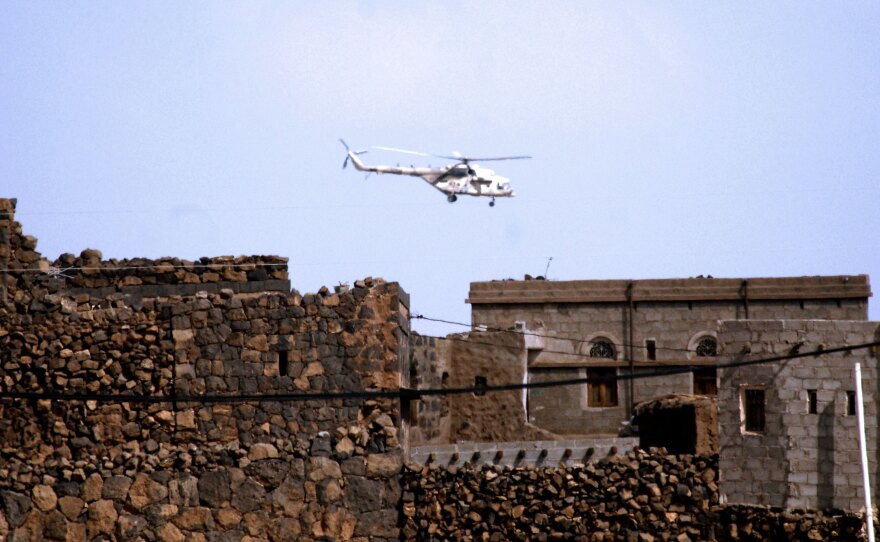The attempted bombing of a Northwest Airlines flight on Christmas Day has thrown a spotlight on the nation of Yemen, after an al-Qaida group based there claimed responsibility for the foiled attack.
The link to Yemen doesn't come as a surprise to many in the counterterrorism world. The United States had already been ramping up its operations in Yemen to counter the al-Qaida threat there.
U.S. intelligence officials have long kept a close eye on Yemen, one of the poorest nations in the Arab world. The country is seen as ripe for Islamist militancy: It has a relatively weak government, which exerts little authority over large parts of the country. There's been a low-level rebellion in the north for years, as well as a secessionist movement in the south. And all this is in addition to the resurgent presence of al-Qaida.
Given that, the United States has been quietly building up its operations for more than a year, says Christopher Boucek, a Yemen expert at the Carnegie Endowment for International Peace. He says there's been a "massive uptick" in the amount of military and security assistance going to Yemen.
"This year, it's somewhere around $60 [million] to $70 million. That's training and equipment, that's help for the border guards, for the coast guard, this is vehicle and communications equipment, night-vision goggles, things like that," he says.

There are also U.S. training programs to help Yemeni counterterrorism units and to beef up the country's security forces, says Thomas Sanderson, with the Transnational Threats Project at the Center for Strategic and International Studies.
"We've been putting in Special Forces. One of the main functions of Army Special Forces, the Green Berets, is to conduct foreign internal defense, counterinsurgency," Sanderson says. He says U.S. involvement in Yemen is nothing new, but that it has picked up recently.
Senior American military and national security officials have been visiting Yemen. And Connecticut Sen. Joe Lieberman, chairman of the Senate Homeland Security Committee, said on Fox News Sunday that the growing number of special operations forces and intelligence officials reflects the Obama administration's concern about Yemen.
"Iraq was yesterday's war. Afghanistan is today's war. If we don't act pre-emptively, Yemen will be tomorrow's war — that's the danger we face," Lieberman said.
Gregory Johnsen, a Yemen expert at Princeton University, says U.S. officials thought they had eradicated al-Qaida in Yemen when an American missile strike killed the group's leader in November 2002. Instead, Johnsen says, al-Qaida in Yemen rebuilt itself into a formidable force, one that is much tougher to battle.
"The organization is set up in a way, and it's so strong, that when you kill key leaders, the organization is able to move on," Johnsen says. "The organization still thrives because there are so many, and they're so entrenched."
Johnsen says that in early 2008, al-Qaida in Yemen merged with an affiliate in neighboring Saudi Arabia. The new group calls itself al-Qaida in the Arabian Peninsula.
"They were this local chapter; then they moved to a regional franchise that's able to launch attacks into Saudi Arabia and into other places. The next step is to get even bigger and get even more ambitious," Johnsen says.
As the Yemen group increases in strength and numbers, so too does U.S. involvement, says Carnegie's Boucek. He predicts greater covert action by the United States, hunting al-Qaida operatives.
U.S. officials refuse to discuss the issue openly. But already this month, there have been two missile attacks on suspected al-Qaida targets. Boucek says those strikes don't bear any resemblance to other Yemeni counterterrorism operations.
"They've usually been very heavy-handed. They're usually massed formations, usually it's artillery barrages or tank movements or things like that. There have not been too many precision strikes," says Boucek. He says it's unlikely anyone will talk about the missile attacks.
The United States is very careful to put a Yemeni face on these types of strikes for fear of destabilizing the government of President Ali Abdullah Saleh, says Sanderson, with the Center for Strategic and International Studies.
"It damages the position of President Saleh if you make a lot of noise about the U.S. going in there," he says. "It weakens his position, and it brings a lot of the opposition figures together."
Still, analysts say it's unlikely these are the last strikes against suspected al-Qaida targets in Yemen, particularly now that there is a link between militants there and the attempted attack on the Northwest Airlines flight Christmas Day.
Copyright 2022 NPR. To see more, visit https://www.npr.org. 9(MDAzMjM2NDYzMDEyMzc1Njk5NjAxNzY3OQ001))







